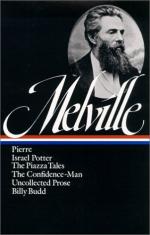“The good word is,” rejoined a censorious old holder, “that you had best go where you belong—on deck—and not be a skulking down here where you don’t belong. I suppose this is the way you skulked during the fight.”
“Oh, you’re growly to-night, shipmate,” said Israel, pleasantly—“supper sits hard on your conscience.”
“Get out of the hold with ye,” roared the other. “On deck, or I’ll call the master-at-arms.”
Once more Israel decamped.
Sorely against his grain, as a final effort to blend himself openly with the crew, he now went among the waisters: the vilest caste of an armed ship’s company, mere dregs and settlings—sea-Pariahs, comprising all the lazy, all the inefficient, all the unfortunate and fated, all the melancholy, all the infirm, all the rheumatical scamps, scapegraces, ruined prodigal sons, sooty faces, and swineherds of the crew, not excluding those with dismal wardrobes.
An unhappy, tattered, moping row of them sat along dolefully on the gun-deck, like a parcel of crest-fallen buzzards, exiled from civilized society.
“Cheer up, lads,” said Israel, in a jovial tone, “homeward-bound, you know. Give us a seat among ye, friends.”
“Oh, sit on your head!” answered a sullen fellow in the corner.
“Come, come, no growling; we’re homeward-bound. Whoop, my hearties!”
“Workhouse bound, you mean,” grumbled another sorry chap, in a darned shirt.
“Oh, boys, don’t be down-hearted. Let’s keep up our spirits. Sing us a song, one of ye, and I’ll give the chorus.”
“Sing if ye like, but I’ll plug my ears, for one,” said still another sulky varlet, with the toes out of his sea-boots, while all the rest with one roar of misanthropy joined him.
But Israel, riot to be daunted, began:
“‘Cease, rude Boreas, cease your growling!’”
“And you cease your squeaking, will ye?” cried a fellow in a banged tarpaulin. “Did ye get a ball in the windpipe, that ye cough that way, worse nor a broken-nosed old bellows? Have done with your groaning, it’s worse nor the death-rattle.”
“Boys, is this the way you treat a watchmate” demanded Israel reproachfully, “trying to cheer up his friends? Shame on ye, boys. Come, let’s be sociable. Spin us a yarn, one of ye. Meantime, rub my back for me, another,” and very confidently he leaned against his neighbor.
“Lean off me, will ye?” roared his friend, shoving him away.
“But who is this ere singing, leaning, yarn-spinning chap? Who are ye? Be you a waister, or be you not?”
So saying, one of this peevish, sottish band staggered close up to Israel. But there was a deck above and a deck below, and the lantern swung in the distance. It was too dim to see with critical exactness.
“No such singing chap belongs to our gang, that’s flat,” he dogmatically exclaimed at last, after an ineffectual scrutiny. “Sail out of this!”




